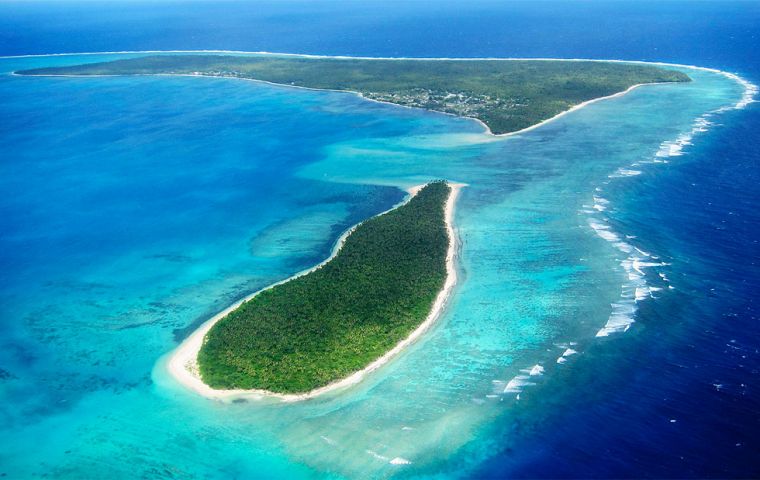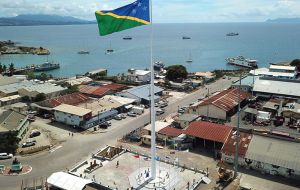MercoPress. South Atlantic News Agency
US, Australia, Japan on watch at Beijing's growing influence of Pacific islands' states
 As island nations Tonga, Fiji and Palau, former territories under the rule of colonial powers, have maintained exchanges with former suzerain states
As island nations Tonga, Fiji and Palau, former territories under the rule of colonial powers, have maintained exchanges with former suzerain states  Solomon Islands, which have an inlet ideal for building a naval port, signed an agreement with a Chinese company to use the entire island for an extended time
Solomon Islands, which have an inlet ideal for building a naval port, signed an agreement with a Chinese company to use the entire island for an extended time China has been stepping up its engagement with South Pacific island nations. It is necessary to monitor China's moves as it looks to win over smaller countries to its side through economic assistance with no concern of how its actions are perceived, turning them into its footholds.
As island nations such as Tonga, Fiji and Palau were former territories under the rule of Britain, France, the United States and Japan, among other countries, they have maintained exchanges with those former suzerain states. They have also deep relations with Australia and New Zealand, both of which are geographically close.
Most such countries have populations ranging from tens of thousands to several hundred thousand, and there are few industries other than tourism, agriculture and fisheries.
Amid their chronic financial difficulties, China has in recent years rapidly increased its presence in those nations through massive capital assistance.
Kiribati is said to have accepted support from China to rehabilitate runways, repair ports and harbors and install satellite tracking facilities, purportedly in the name of tourism development. Runways, ports, harbors and communications facilities can also be used for military purposes.
China has so far obtained the right to use facilities such as ports and harbors in exchange for its aid in Africa and Asia. South Pacific island nations must beware of falling into China's “debt trap.”
In 2019, the Solomon Islands, which has an inlet suitable for building a naval port on one of its islands, signed an agreement to allow a Chinese state-owned company to use the entire island for an extended time.
Later, the United States and Australia, concerned that China might turn the island into a military foothold, pressured the Solomon Islands to cancel the agreement. This example should be used as a reference.
On an island of Papua New Guinea, a project with China's capital to build a fishing port has surfaced. As the island is close to mainland Australia, there is growing concern in Canberra that the fishing port could be used as a base for Beijing's reconnaissance activities.
The total loans China has extended to South Pacific island countries is estimated to exceed 20% of the region's gross domestic product. As in the case of the South China Sea, China apparently intends to increase its influence in the region while strengthening its support to coastal nations.
In the South Pacific, six countries had diplomatic relations with Taiwan, but the number decreased to four after Kiribati and the Solomon Islands took sides with China in 2019. China is expected to continue its efforts to win over the remaining countries in the region to its side.
Stability in the South Pacific has been maintained mainly by the alliance between the United States and Australia. If China's military influence expands in the region, it could undermine such a balance.
It is important for Japan, the United States and Australia to cooperate with Britain and France to strengthen their security cooperation against China's ambitious maritime advances.
Japan hosts a summit meeting with Pacific island nations once every three years. At a summit this month, Tokyo announced the free provision of Covid-19 vaccines.
Japan needs to maintain a relationship of trust with these island nations with its unique and meticulous support, such as measures against climate change and those for human resources development. (Asia News Network).




Top Comments
Disclaimer & comment rulesCommenting for this story is now closed.
If you have a Facebook account, become a fan and comment on our Facebook Page!